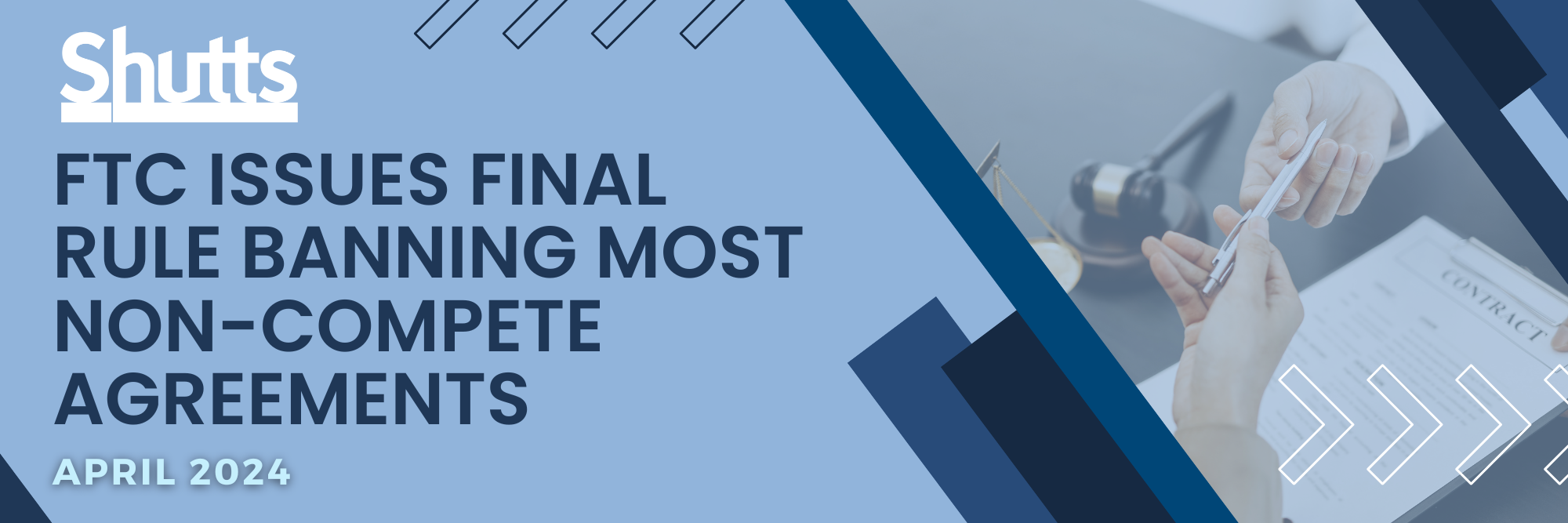
On April 23, 2024, the Federal Trade Commission, by a vote of 3-2, issued a Final Rule concerning unfair methods of competition and non-compete agreements. The Rule will become effective 120 days after its publication in the Federal Register (the “effective date”). The Rule applies to employees, independent contractors, externs, interns, volunteers, apprentices, and sole proprietors who provide a service to a person. It specifically excludes franchisees in the context of a franchisor/franchisee relationships.
The Rule defines a “non-compete clause” as a term or condition of employment that prohibits a worker from, penalizes a worker for, or “functions to prevent” a worker from (1) seeking or accepting work in the United States with a different person after the conclusion of their employment or (2) operating a business in the United States after the conclusion of their employment.
With respect to workers other than senior executives, a person may not enter or attempt to enter into a non-compete clause, enforce or attempt to enforce a non-compete clause, or represent that the worker is subject to a non-compete clause.
Senior executives are treated slightly differently. A person may not enter into or attempt to enter into a non-compete clause; however, the rule does not prohibit enforcement of a non-compete clause entered into before the effective date of the Rule, or stop an employer from representing that a senior executive is subject to a non-compete clause that was entered into before the effective date. To qualify as a senior executive, the worker must have been in a policy-making position (that is, the type of policy-making authority that an officer of the entity has) and must have received total annual compensation (salary, commissions, nondiscretionary bonuses and other non-discretionary compensation) of at least $151,164 for the preceding year (annualized under certain circumstances).
The Rule will permit non-compete agreements in the context of a bona fide sale of a business and does not apply where a cause of action related to a non-compete clause accrued prior to the effective date. It also provides that it is not an unfair method of competition to enforce or attempt to enforce, or make representations about, a non-compete clause where a person has a good faith belief that the Rule does not apply.
Importantly for employers, the Rule also imposes notification requirements that must be met before the effective date. In particular, for each prohibited non-compete clause, the employer “must provide clear and conspicuous notice to the worker by the effective date” that the non-compete clause will not be and cannot legally be enforced against the worker (both current and former). The Rule includes model language that will constitute the requisite notice, as well as specific instructions for how to provide notice.
The Rule has implications for other types of agreements that may functionally serve as non-competes, such as non-solicitation agreements, non-disclosure agreements, or training repayment agreements. While there are already legal challenges to the Rule, in the meantime, unless an applicable injunction or stay is issued, once the Rule is published, the 120-day deadline will fast approach.
The materials in this summary were prepared by Shutts & Bowen LLP for informational purposes only and should not be construed as legal advice. This information is not intended to create, nor does receipt or review of it constitute or create an attorney-client relationship.
Should you have any questions on how this decision may impact your business, please reach out to Shutts & Bowen’s Labor & Employment Team at LEAlert@shutts.com.
